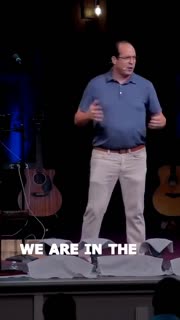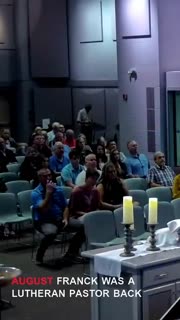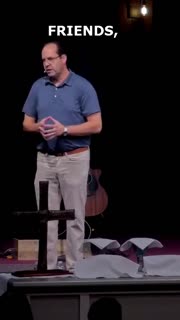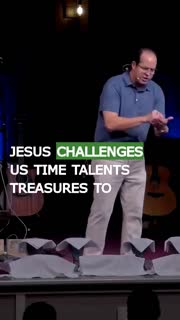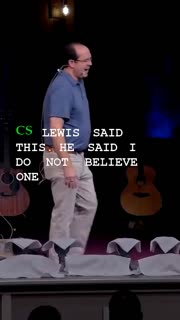Aligning Our Treasures with God's Heart
Devotional
Sermon Summary
Bible Study Guide
Sermon Clips
1. "We are in the middle of a series entitled Habits of a Healthy Heart, things that we can do to follow Jesus that impact our relationship with Him, our relationship with the kingdom. We've talked about time and the gift, that time is a gift from God that we need to use to benefit His kingdom, to benefit the world, to share Jesus with the world. We talked about talents, how we can better serve and utilize our gifts. As Andy talked about that last week, again, to come together, to be all in, to build ourselves up, but also to build up the church and to reach out the community, to be the hands and feet of Christ." [32:09] (51 seconds)
2. "August Franck was a Lutheran pastor back after the Reformation in the middle to late 17th century, early 18th century was when he lived and where he had his ministry. As he served, there were many factors wars, diseases that brought about many homeless children. And so August took it upon himself to found an orphanage and a foundation which is in existence even unto this day. And he founded that orphanage to help meet the needs growing in the community, to help take in as many children as he possibly could. But it was certainly a test of faith and a test of perseverance because it was difficult running an orphanage. It was expensive as more and more children to care for and to feed and to clothe and to provide for." [36:00] (70 seconds)
3. "Friends, as we reflect on treasure today, it's a topic that a lot of us maybe don't like to talk about. Money, finances. Wells Fargo, a couple years ago, did a survey. 44% of you said you don't like. You don't like to talk about money and finances. So, I'm already standing up here and this will be the worst sermon I give this year. Right? 44% say that. And yet Jesus, as he taught, as he ministered, he talked about money. He talked about finances. About one in seven of his words in the red letters. Now let me give a caveat to that. He didn't teach. He didn't teach about giving. He didn't teach about finances in all of the times he mentioned money. He taught some of the time, like in our lesson today. But he also used finances, money, as a object lesson in the parables." [41:01] (68 seconds)
4. "Give back to Caesar what is Caesar's. Give back to God what is God's. Now, the Greek word, as you look at what is God's, was a word that was used when God created the world at the beginning. It was a world that he created males. It was a world that he created males. And females in his own image. Right? And so, he's saying, give back to God what is in God's own image. Right? Give back to God a life that is living in God's image. That is being that disciple. The one you're created to be. You're created in the image of God. So, give back in all you do and say. Your time. Your talents. Your treasures. Give back to God like you are. The image. The image of God for the church. For the world. For your community." [43:48] (56 seconds)
5. "Jesus challenges us time talents treasures to examine it all to lay it all down and to pick up our cross and to follow him friends. We do that in all those ways. We talked about going through as burying the support. And And so that is Jesus's way in the passage today give back to God. What is God's? Well, we're never going to decide on exactly how much that is. We know it's somewhere between the minimum tithe and near that forty to fifty percent. There's going to be no way that we can discern that but Jesus was a faithful Israelite. And when he said that he was talking from the ancient Israelite tradition. That he tall he tall foundationally from the Ten Commandments from the Mosaic law. And so for Jesus it was giving from the heart all that we can to honor our God to honor our Lord." [58:52] (68 seconds)
6. "CS Lewis said this. He said I do not believe one can settle how much we ought to give when it comes to our treasure. I am afraid. The only safe rule is to give. Give more than what we can spare. God gave it all. May we do what we can to give as much as we can for his glory. And to build up his church and to build up his kingdom." [01:02:44] (31 seconds)
Ask a question about this sermon
2. "August Franck was a Lutheran pastor back after the Reformation in the middle to late 17th century, early 18th century was when he lived and where he had his ministry. As he served, there were many factors wars, diseases that brought about many homeless children. And so August took it upon himself to found an orphanage and a foundation which is in existence even unto this day. And he founded that orphanage to help meet the needs growing in the community, to help take in as many children as he possibly could. But it was certainly a test of faith and a test of perseverance because it was difficult running an orphanage. It was expensive as more and more children to care for and to feed and to clothe and to provide for." [36:00] (70 seconds)
3. "Friends, as we reflect on treasure today, it's a topic that a lot of us maybe don't like to talk about. Money, finances. Wells Fargo, a couple years ago, did a survey. 44% of you said you don't like. You don't like to talk about money and finances. So, I'm already standing up here and this will be the worst sermon I give this year. Right? 44% say that. And yet Jesus, as he taught, as he ministered, he talked about money. He talked about finances. About one in seven of his words in the red letters. Now let me give a caveat to that. He didn't teach. He didn't teach about giving. He didn't teach about finances in all of the times he mentioned money. He taught some of the time, like in our lesson today. But he also used finances, money, as a object lesson in the parables." [41:01] (68 seconds)
4. "Give back to Caesar what is Caesar's. Give back to God what is God's. Now, the Greek word, as you look at what is God's, was a word that was used when God created the world at the beginning. It was a world that he created males. It was a world that he created males. And females in his own image. Right? And so, he's saying, give back to God what is in God's own image. Right? Give back to God a life that is living in God's image. That is being that disciple. The one you're created to be. You're created in the image of God. So, give back in all you do and say. Your time. Your talents. Your treasures. Give back to God like you are. The image. The image of God for the church. For the world. For your community." [43:48] (56 seconds)
5. "Jesus challenges us time talents treasures to examine it all to lay it all down and to pick up our cross and to follow him friends. We do that in all those ways. We talked about going through as burying the support. And And so that is Jesus's way in the passage today give back to God. What is God's? Well, we're never going to decide on exactly how much that is. We know it's somewhere between the minimum tithe and near that forty to fifty percent. There's going to be no way that we can discern that but Jesus was a faithful Israelite. And when he said that he was talking from the ancient Israelite tradition. That he tall he tall foundationally from the Ten Commandments from the Mosaic law. And so for Jesus it was giving from the heart all that we can to honor our God to honor our Lord." [58:52] (68 seconds)
6. "CS Lewis said this. He said I do not believe one can settle how much we ought to give when it comes to our treasure. I am afraid. The only safe rule is to give. Give more than what we can spare. God gave it all. May we do what we can to give as much as we can for his glory. And to build up his church and to build up his kingdom." [01:02:44] (31 seconds)
